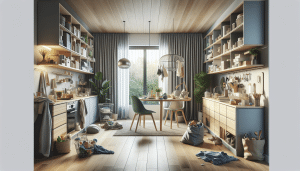How Simple Living Leads to Greater Focus
Jessica White August 6, 2025
In today’s fast-paced world, it’s easy to feel overwhelmed by the sheer volume of tasks, distractions, and choices that demand our attention. With so many commitments and obligations, it can be challenging to stay focused on what truly matters. However, embracing a Simplified Living and Focus can help reduce mental clutter and improve concentration. Simple living, which involves streamlining your environment, activities, and mindset, can create the mental space necessary for greater focus. In this article, we explore how simplifying your life can lead to enhanced concentration, improved productivity, and a more fulfilling life.

What is Simple Living?
Simple living refers to a lifestyle that prioritizes essentials, reduces excess, and embraces minimalism in various areas of life. It’s about making intentional choices that align with your values, allowing you to focus on what’s most important and eliminate distractions. Simple living can include various aspects, such as:
- Reducing Clutter: Minimizing physical possessions and organizing your space.
- Simplifying Your Schedule: Cutting out unnecessary commitments and focusing on activities that bring value.
- Mindful Consumption: Being intentional about the products you buy, the media you consume, and how you spend your time.
By simplifying your life in these ways, you create more space for focus, productivity, and peace of mind.
For more on the principles of simple living, see Psychology Today’s article on the Benefits of Minimalism.
How Simplifying Your Environment Boosts Focus
One of the most significant ways simple living enhances focus is by reducing the distractions in your physical environment. A cluttered space can lead to a cluttered mind, making it difficult to concentrate on important tasks. By creating an organized, minimalist environment, you free your mind from unnecessary distractions and create a more conducive space for focus.
- Clear Desk, Clear Mind: Studies have shown that cluttered workspaces can negatively affect productivity and mental clarity. By maintaining a clean, organized environment, you can minimize distractions and create a space that encourages focused work.
- Decluttering Your Home: A cluttered home can also contribute to stress and overwhelm. When you simplify your living space, you create an atmosphere of calm, which can help you feel more grounded and focused on your goals.
For more on how decluttering affects focus, read The Benefits of Decluttering for Mental Clarity.
Simplifying Your Schedule for Greater Focus
A complex and busy schedule can quickly lead to burnout and a lack of focus. When your day is packed with obligations, tasks, and appointments, it’s difficult to prioritize what’s most important. By simplifying your schedule and reducing unnecessary commitments, you allow yourself more time and energy to focus on key activities.
- Eliminating Time-Wasters: Simple living encourages you to identify and eliminate time-wasting activities that don’t contribute to your long-term goals. Whether it’s reducing screen time, cutting out unproductive meetings, or saying no to non-essential tasks, streamlining your schedule allows you to focus your attention on what truly matters.
- Creating Space for Rest: A simplified schedule also makes room for rest and relaxation. By prioritizing downtime, you ensure that you’re recharged and ready to focus when needed. Rest is crucial for maintaining mental clarity and avoiding decision fatigue.
For more on simplifying your schedule, check out Time Management Strategies for a Simpler Life.
Mental Clarity Through Mindful Consumption
In a world filled with information overload, it’s easy to become distracted by the constant barrage of media, advertisements, and digital notifications. Simple living encourages you to consume information more mindfully, allowing you to focus on what’s important and eliminate mental clutter.
- Reducing Digital Distractions: Constant notifications from your phone, social media, and emails can disrupt your concentration. By simplifying your digital habits—such as limiting screen time or turning off unnecessary notifications—you can reduce distractions and improve focus.
- Choosing Meaningful Content: Simple living encourages you to consume content that aligns with your values and goals. By carefully selecting the information you absorb, you create space for deeper thinking and more intentional actions.
For more on reducing digital distractions, read Psychology Today’s guide on Digital Minimalism.
The Role of Mindfulness in Simple Living
Mindfulness plays a key role in simple living by helping you stay present in the moment and reduce mental distractions. When you are mindful, you focus on the task at hand and fully engage with the present experience, which increases your ability to concentrate and make better decisions.
- Mindful Practices for Focus: Incorporating mindfulness techniques, such as meditation or deep breathing, into your routine helps you train your mind to focus more effectively. These practices improve your ability to tune out distractions and stay focused on the task at hand.
- Living with Intention: Simple living encourages you to live with intention, making mindful choices about how you spend your time, energy, and attention. By practicing mindfulness in all areas of your life, you create more opportunities for focus and productivity.
For more on the role of mindfulness in simple living, check out Mindful Living and Focus.
How Simplified Living Improves Mental Health
In addition to improving focus, simple living can have significant benefits for mental health. When you reduce the mental and physical clutter in your life, you create space for clarity, peace, and emotional well-being.
- Reducing Stress: Simplifying your life by eliminating unnecessary stressors—such as chaotic environments or overbooked schedules—reduces anxiety and improves overall mental health. Less stress leads to greater focus, as your mind is free to concentrate on what matters most.
- Enhanced Emotional Balance: Simple living allows you to focus on nurturing your emotional health. With less distraction and more time for self-care, you can prioritize your mental well-being, which supports greater focus and productivity.
For more on how simple living benefits mental health, check out The Mental Health Benefits of Simplification.
Conclusion: Simplifying Your Life for Greater Focus
Creating a simpler life by reducing clutter, streamlining your schedule, and practicing mindfulness can have a profound impact on your ability to focus. By removing distractions and prioritizing what truly matters, you allow yourself the mental clarity and energy needed to stay focused and productive. Whether it’s simplifying your environment, your routine, or your digital habits, embracing simplicity can lead to a more intentional, fulfilling life with greater focus and clarity.
References:
- Psychology Today. (2018). How Decluttering Improves Your Focus. Retrieved from https://www.psychologytoday.com/us/articles/2018/08/how-decluttering-improves-your-focus
- MindTools. (2021). Time Management for Simplified Living. Retrieved from https://www.mindtools.com/pages/article/time-management-for-simplified-living.htm
- Psychology Today. (2020). The Benefits of Digital Minimalism. Retrieved from https://www.psychologytoday.com/us/articles/2020/02/the-benefits-of-digital-minimalism
- Psychology Today. (2017). Mindful Living for Improved Focus. Retrieved from https://www.psychologytoday.com/us/articles/2017/10/mindful-living-for-improved-focus
- Psychology Today. (2019). How Simplifying Your Life Can Improve Mental Health. Retrieved from https://www.psychologytoday.com/us/articles/2019/04/how-simplifying-your-life-can-improve-mental-health








